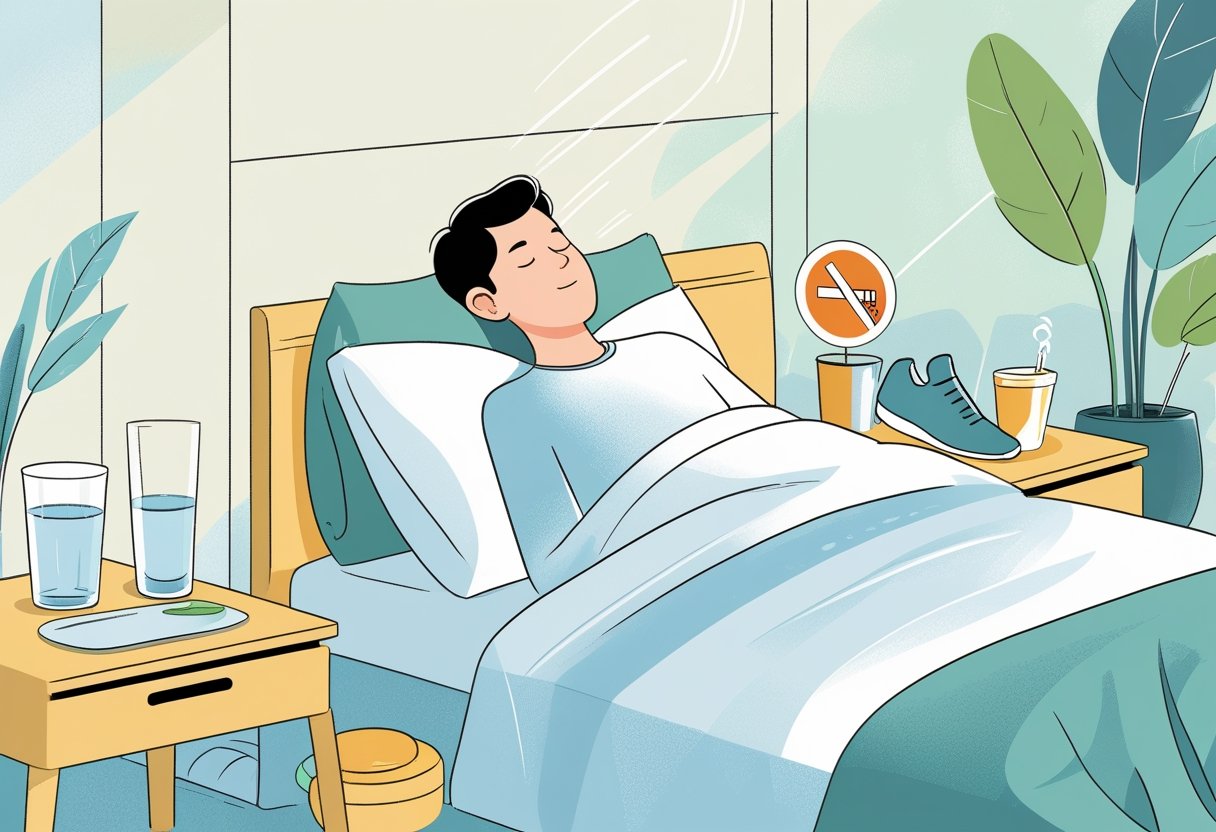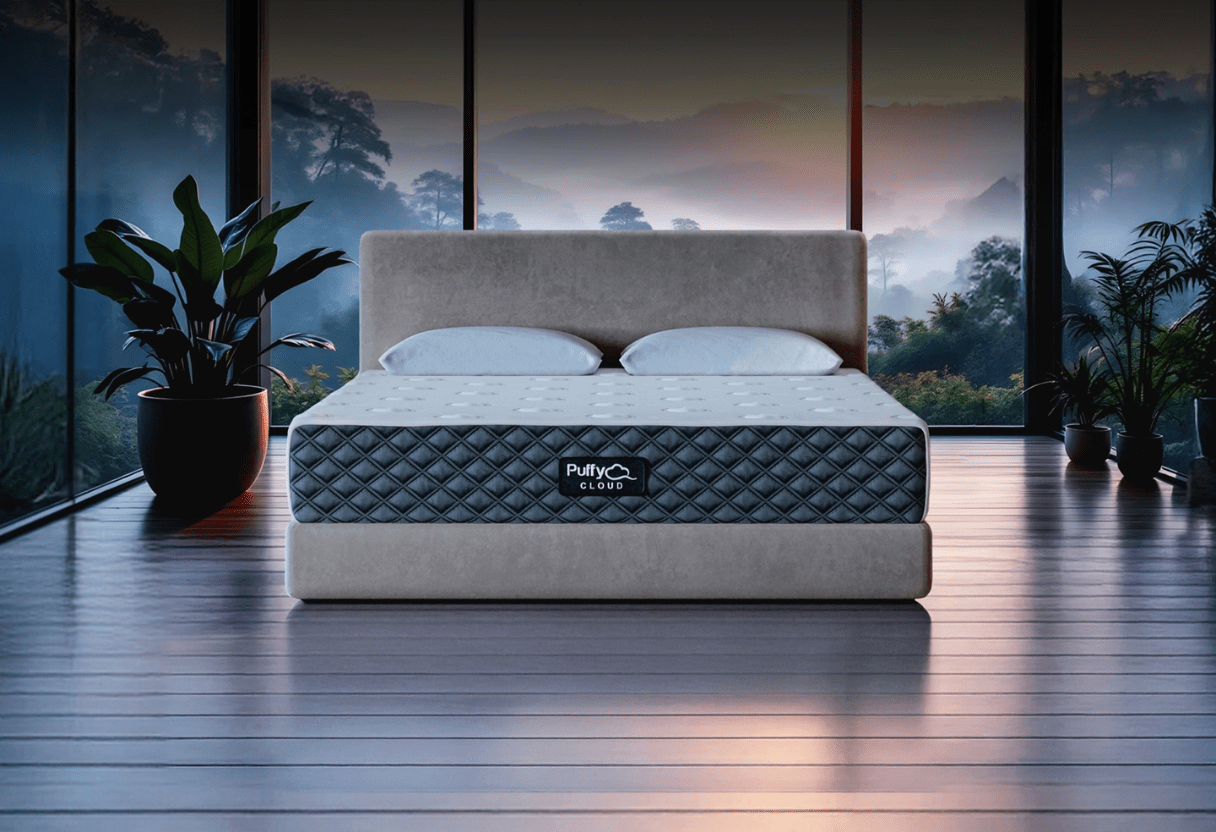Snoring can be a real nightmare for both the person who snores and their partner. Fortunately, there is a simple solution to the issue, which is changing the sleeping position. The most advantageous position to minimize snoring is sleeping on the side, as it keeps the airways open and positions your throat tissues away from your airway.
When sleeping on your back, your soft palate and tongue will fall back, and you will close your airway, and snore. Even though sleeping on your stomach will reduce snoring, it can lead to neck and back pain. Sleeping on your side is a perfect compromise, which reduces snoring and is comfortable as well.
It is worth mentioning that changing your sleep position is not necessarily easy and may require some time for adjustment. However, you can ease the process by implementing a few modifications in your nighttime habits and sleeping positions. In the course of this article, we will be outlining a number of ways through which you can sleep in a position that reduces snoring as well as improves the quality of your sleep.
Key Takeaways
- Side sleeping is most successful in reducing snoring.
- Sleeping on your back heightens the chances of snoring by closing airways.
- Changing sleeping patterns improves snoring and sleep quality in the long run.
- Choosing a mattress that is supportive enough for side sleeping keeps airways open and reduces snoring since it encourages a posture in which the tongue does not block airflow.

Understanding Snoring And Its Causes

Snoring happens when the flow of air is partly blocked during sleep, causing the tissues in your throat to vibrate. This can happen for all sorts of reasons, from the shape of your mouth and throat to lifestyle habits like having a nightcap before bed.
What Is Snoring?
Snoring is the sound that occurs when air passes through loose tissues in the throat while sleeping. It can be harsh or rattling and it happens due to the excessive relaxation of the muscles in the throat, which constricts the airway. While snoring itself is common, it can mess with sleep quality for both you and anyone unlucky enough to share a room. Sometimes, it’s just harmless noise. Snoring can also be a sign of an underlying health condition such as obstructive sleep apnea, which requires medical treatment.
Normal snoring is most associated with sleep apnea, and it is a fact that one of the most common signs is indeed snoring. However, not all snoring is sleep apnea, and not all sleep apnea comes with snoring. Normal snoring may be innocuous, but sleep apnea is a serious disorder where breathing stops repeatedly while asleep.
Signs and symptoms of sleep apnea include:
- Loud or raspy snoring that disturbs you or your bed partner
- Pauses in breathing during sleep
- Nighttime episodes of gasping or choking
- Daytime fatigue or being unrefreshed when you wake up
- Headaches or dry mouth in the morning
- Memory or concentration difficulty
- Irritability or mood change
- High blood pressure or worsening of heart disease
- Waking up many times to use the toilet at night
If you experience these, get immediate medical attention.
Common Causes Of Snoring
The cause of snoring is a constricted airway while sleeping. This constriction results from:
- Mouth and throat structure: Large tonsils, thick soft palate, or long uvula blocks airflow.
- Nasal obstruction: Stuffy nasal passages due to allergies or a deviated septum prevent breathing.
- Muscle relaxation: Throat muscles relax and droop, especially when sleeping on the back.
- Lifestyle habits: Obesity, alcohol consumption before bedtime, and smoking obstructs the airway.
In order to avoid snoring, begin by preventing such causes, such as avoiding alcohol or curing nasal congestion to open up breathing channels.
Risk Factors And Who Is Affected
Certain factors raise the risk of snoring, such as:
- Age: With advancing age, muscle tone is lost, and thus snoring becomes commoner.
- Gender: Snoring is more common among men than women, but women too snore, especially after menopause.
- Obesity: Extra fat in the neck compresses the airway.
- Sleep position: Back sleeping tends to make snoring worse by allowing the tongue to fall back.
Women looking to eliminate snoring may require special strategies because hormonal changes affect their risk. Children snore too and have different treatments for snoring. Identifying risk factors helps in choosing proper snoring assistance.
Why Sleep Position Matters For Snoring
Sleep position influences air movement through the throat. Some postures block the airway and worsen snoring, while others maintain it. Minor adjustments in head and body posture decrease snoring by enhancing airflow.
The Relationship Between Sleep Posture And Airway
When an individual sleeps on their back, gravity causes the tongue and soft tissues to pull toward the airway. This does partially obstruct airflow and leads to vibrations, which create snoring noises. Side sleeping stops this because the tongue and muscles of the throat drop forward, opening up the airway.
The patency of the airway is crucial to minimize snoring. Restricted or obstructed airways result in noisy breathing. Altering sleeping position is a straightforward means of maintaining patent airways without any dependency on medical equipment or medication.
Back Sleeping vs. Side Sleeping
Snoring is aggravated when sleeping on the back. The muscles of the tongue and throat get relaxed and easily block airflow while sleeping on the back. This is the reason many individuals who wish to end snoring are advised against turning over.
Side sleeping is still the optimal sleep position for snoring. Side sleeping minimizes airway obstruction and diminishes the loudness of snoring. Some also attempt stomach sleeping, but this causes neck strain and is less comfortable.
Head Elevation And Snoring
Pillowing the head higher while sleeping serves to minimize snoring by enhancing airway alignment. Head raising using additional pillows or an adjustable bed brings about gravitational traction of the tongue and tissues from the throat.
Sleeping at an incline between 30 to 45 degrees keeps the airway open. This lowers the vibration that produces snoring without a need to change body posture. Head elevation usually performs well when mixed with side sleeping to provide improved outcomes.

Best Sleep Positions To Reduce Snoring
Sleeping position greatly affects snoring. Certain postures keep the airway open, which limits noise caused by blocked airflow. Adjusting these positions may help reduce or stop snoring during sleep.
Side Sleeping For Snoring Relief
Sleeping on the side is one of the best ways to stop snoring, as it prevents the tongue and soft tissues from collapsing into the throat, which blocks airflow when lying on the back. Side sleeping keeps airways more open and reduces the vibrations that cause snoring. It’s especially great for people whose snoring results from airflow blockage.
Using a body pillow helps maintain this position throughout the night. Still, people should make sure their neck and spine receive proper support to avoid discomfort.
Elevated Head Position
Raising the bed head or placing an extra pillow behind the back reduces snoring by decreasing pressure in the airway. An elevated head position allows gravity to maintain the airway in the open position. This inhibits the tongue and soft palate from falling backward, a usual snoring cause when sleeping on the back.
People can use adjustable beds or wedge pillows to attain this elevation. This technique is an easy method of decreasing snoring without altering overall sleeping position. Avoid using multiple pillows since this could lead to neck strain and decrease sleep quality.
Stomach Sleeping: Pros And Cons
Stomach sleeping may minimize snoring because it keeps the airway open and does not allow the tongue to fall back and block airflow. Stomach sleeping has its disadvantages, though. It causes neck and back discomfort due to the improper alignment of the spine. Stomach sleeping also caves in the chest, which is uncomfortable for others.
Because of these concerns, sleeping on the stomach is seldom advised for extended periods. Those who attempt it to conserve money in snoring must take into account pillow selection and bed hardness to reduce discomfort.

Effective Ways To Transition To Better Sleep Positions

It takes support and practice to change sleep position in order to minimize snoring. Having the correct tools and breaking into new habits ensures that it is simpler to keep airways open with a position that is less snoring-inducing.
Using Pillows And Positioning Supports
Side sleepers may find relief with pillows designed to support a consistent sleeping position. Pregnancy pillows or long body pillows provide full-length support so you won’t roll onto your back at night. Adjustable pillows that tilt your head upwards may also be beneficial in preventing throat tissue collapse, which is a common source of snoring.
If you need to minimize snoring, look for pillows that ensure your spine and neck are properly aligned. This can aid in keeping your airways open and enhancing your breathing pattern as you sleep. Wedge pillows or pillows designed to be anti-snore pillows can also minimize snoring. They function by elevating your head somewhat and making you sleep on your side instead of your back.
Training Yourself To Sleep On Your Side
Training the body to stay on the side takes effort and time. One popular option is having a tennis ball or other soft object sewn to the back of a shirt. It makes turning onto the back painful and helps promote sleeping on the side.
Having a bedtime routine also trains the body to get used to the new position. With time, sleeping on the side is natural, and snoring decreases with less struggle. Deep breathing and relaxation exercises prior to sleep also facilitate this transition, which is easier to sustain throughout the night.
Lifestyle Modifications For Snoring Reduction
The alteration of daily life is most important in managing snoring. Minor changes like the enhancement of body weight, evasion of some substances, and nasal condition management decrease snoring naturally.
Weight Loss And Healthy Habits
Overweight, particularly around the neck, causes strain on the airway, constricting it and heightening snoring. Losing weight through a balanced diet and regular exercise opens the airway and reduces snoring. A healthy lifestyle such as stopping smoking enhances breathing and minimizes inflammation in the airway. Smoking causes irritation to the airway and may make snoring more severe. Drinking plenty of water also keeps tissues in the throat from adhering to each other, decreasing snoring.
Maintaining a consistent sleep schedule improves overall sleep quality. Poor sleep worsens snoring by causing greater throat muscle relaxation. Weight loss and healthy lifestyle habits serve as proven remedies for snoring that work naturally over time.
Avoiding Alcohol And Sedatives
Alcohol and sedatives weaken throat muscles more than normal at night. This added weakening adds to the likelihood of airway collapse and increased snoring. Avoiding alcohol consumption four or five hours prior to bed minimizes this risk. Sedatives, such as certain sleeping medications, must be consulted about by a doctor before use, as they can exacerbate snoring.
For those seeking natural snoring relief, avoiding these substances in the evening supports firmer throat muscles. This helps keep the airway open and prevents loud snoring or breathing interruptions.
Managing Allergies And Nasal Congestion
Congested nasal passages cause mouth breathing, which tends to be noisier snoring. Antihistamines or nasal sprays alleviate allergies to treat them and eliminate nasal congestion. A saline rinse or humidifier is also useful in easing nasal congestion. When a deviated septum or recurring nasal problems arise, visit a physician for potential treatment to enhance breathing.
Improved nasal breathing decreases airway resistance and facilitates easier prevention of snoring. Treatment of these conditions becomes a significant move towards effective snoring remedies and prevention.

When To Seek Advanced Solutions
Sometimes, a change in sleeping position alone is not enough to prevent snoring. When snoring causes disturbed sleep or breathing issues, more specific interventions are required. They range from devices to open up airways or surgery to eliminate the obstructions.
Medical Devices For Snoring
Medical appliances help individuals who require more than simple changes in sleeping position. One such appliance is the mandibular advancement device (MAD), which is placed within the mouth and advances the lower jaw. This movement keeps the airway open by stopping the tongue and soft tissues from falling back while asleep.
The other is the use of the CPAP machine, in which air pressure keeps the airway open. While extremely effective, some do not wish to use CPAP due to its bulkiness or discomfort. Other appliances are nasal strips or inserts, which enhance the flow of air in the nose. These are less invasive but often best utilized in mild snoring.
Because each device works in a different way, visiting a doctor maximizes the optimal selection based on the reason and degree of snoring.
Surgical Treatments
Surgery is usually a consideration when other snoring treatments are ineffective or when physical obstructions compromise the airway. Procedures range from invasive to minimally invasive and aim to enhance air flow through the removal or tightening of tissues.
Typical procedures are uvulopalatopharyngoplasty (UPPP) to remove extra tissue in the throat and septoplasty to repair a crooked nasal septum. They decrease or eliminate snoring due to structural issues. Some patients have radiofrequency tissue ablation, which causes shrinking of soft tissues in the airway and has little recovery time.
Since surgery has risks like pain, swelling, and potential alterations in voice or swallowing, it must be a last choice after thorough examination by a health expert for non-surgical treatments.

Tips For Long-Term Snoring Prevention
Prevention of snoring demands uninterrupted effort and consideration for matters that influence sleeping quality and respiratory tract health. Alteration of sleeping habits, monitoring sleeping quality, and selecting the appropriate mattress and sleeping position assist in successfully preventing snoring.
Establishing Healthy Sleep Routines
A consistent sleeping pattern enables the body to have normal rest cycles, which can lower snoring. Sleeping and waking up at the same hour every day maintains regular breathing patterns. Refrain from alcohol and large meals before retiring to bed to decrease the likelihood of airway constriction while sleeping.
Maintaining a quiet and cool bedroom improves sleep quality, allowing airway muscles to relax but remain open with ease. Nasal strips or humidifiers are beneficial to individuals with mild congestion and avoid nasal blockage snoring. These habits help promote snoring prevention in the long term by targeting common triggers.
Monitoring Sleep Quality
Monitoring sleep patterns determines when and how bad snoring happens. Machines such as sleep monitors or phone apps measure snoring noises and movements. These data indicate where snoring is connected to particular positions or sleep phases so changes can be made accordingly.
Periodical examination of this information prompts changes like enhancing pillow height or altering sleeping time. It also uncovers conditions that may necessitate medical help. Regular checking of sleep quality raises the opportunity to eliminate snoring by identifying things that aggravate it.
How to Pick the Right Mattress and Sleep Position to Stop Snoring

A mattress that provides spinal alignment decreases pressure on the airway and throat. A medium-firm mattress enables the body to relax evenly and does not strain the neck, thus reducing the airway. Mattresses such as the Puffy Cloud Mattress offer even support and pressure relief, which is excellent for improved spinal alignment and comfort.
The Puffy Cloud Mattress combines contouring and soft memory foam with a pressure-relieving base layer that cradles the pressure points while keeping the spine aligned. The balance relieves tension in the neck and back, which aggravates breathing issues while sleeping. Its breathable fabrics facilitate ventilation, which makes the mattress cool and cozy all night.
Side sleeping is optimal to avoid snoring as it keeps the tongue and soft tissues from occluding the airway. Back sleeping tends to aggravate snoring. Side-sleeping pillows or positional devices maintain an individual from rolling onto the back. Alongside the suitable mattress, sleeping position is still one of the most effective measures to limit snoring in the long run.
Further, the foam layers of Puffy Cloud Mattress provide just the right amount of bounce to make it easier to move while sleeping without compromising on support. This aspect favors those individuals who change sleeping positions but yet would like to keep the airways in healthy alignment. Overall, the use of a mattress such as the Puffy Cloud Mattress can enhance sleep quality along with preventing snoring based on improper spinal positioning.
Frequently Asked Questions
Snoring occurs because blocked airways restrict airflow during sleep. Adjusting sleep positions and using simple aids improves airflow and reduces snoring in many cases.







